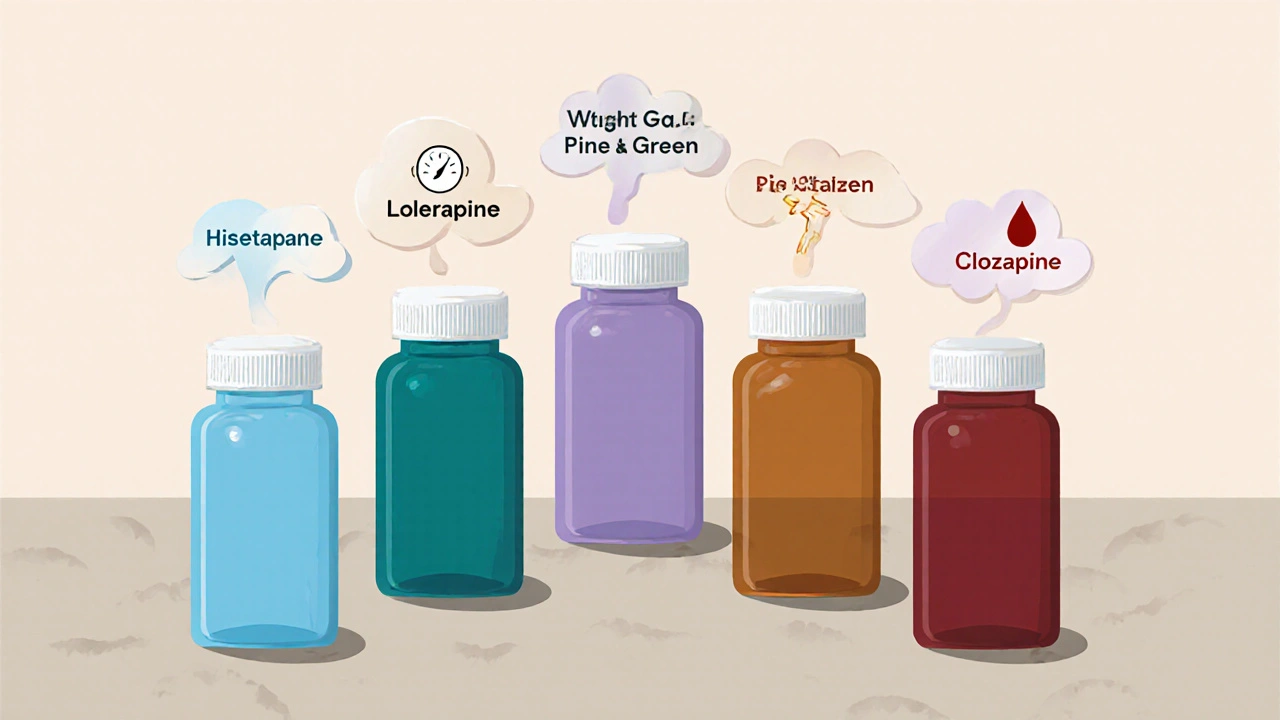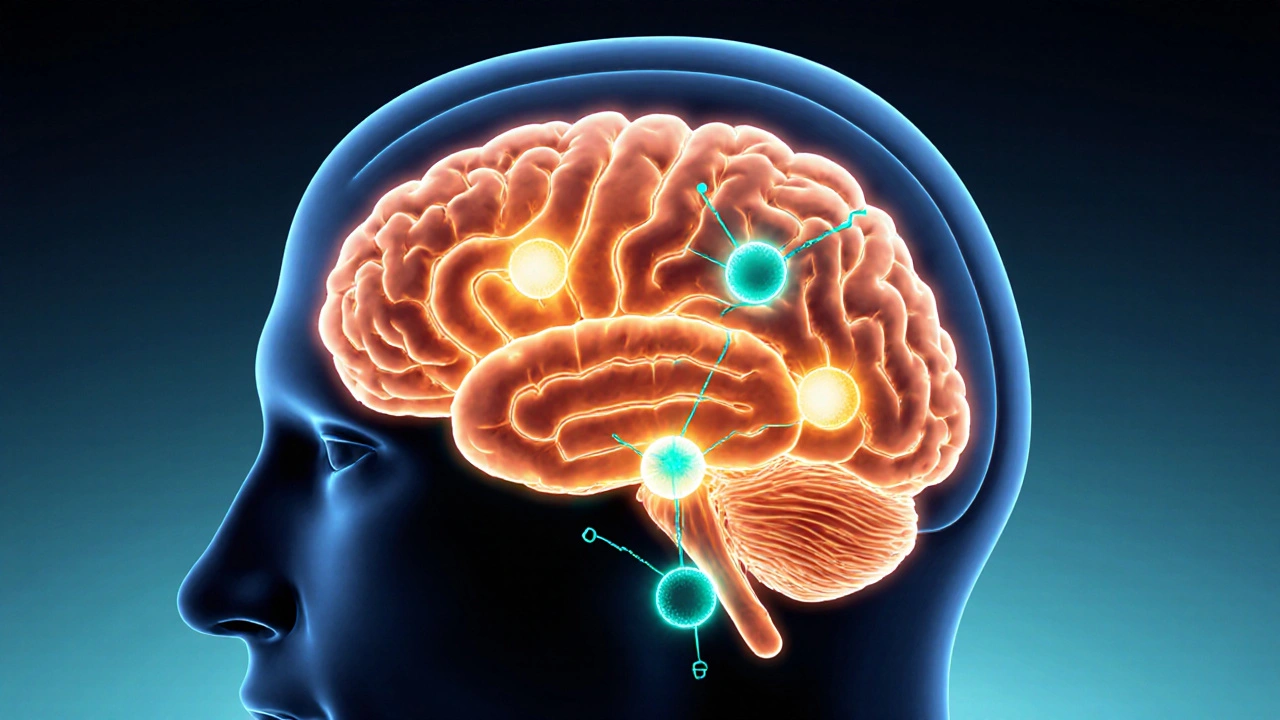Antipsychotic Medication Decision Tool
Find the right antipsychotic for your needs
Select your top concerns to see which medications might work best for you based on side effects, metabolic impact, and other factors.
What are your main concerns?
Comparison Results
Abilify (Aripiprazole)
Risperidone
Quetiapine
Olanzapine
Haloperidol
Clozapine
Your Recommended Options
Based on your priorities, the most suitable medications for you are:
When doctors prescribe medication for schizophrenia, bipolar disorder, or major depressive disorder, they often start with Abilify (Aripiprazole), a dopamine partial agonist that balances brain chemistry without causing full blockade. Many patients wonder whether there are better‑tolerated or more affordable options, especially when side effects start to bite. This guide breaks down the most common alternatives, lines up key attributes, and helps you decide which drug might fit your needs.
Key Takeaways
- Abilify is unique as a dopamine partial agonist, offering lower risk of weight gain compared with many older antipsychotics.
- Risperidone and Quetiapine are widely used first‑line choices with solid efficacy but higher metabolic side‑effect profiles.
- Olanzapine delivers strong symptom control but can cause significant weight gain and cholesterol changes.
- Haloperidol is an older typical antipsychotic; it is cheap but carries a higher risk of movement disorders.
- Clozapine is reserved for treatment‑resistant cases because of its superior efficacy and serious blood‑monitoring requirements.
How Abilify Works
Abilify’s mechanism hinges on partial activation of dopamine D2 receptors while also influencing serotonin 5‑HT1A (agonist) and 5‑HT2A (antagonist) pathways. This mixed action helps reduce psychotic symptoms without fully shutting down dopamine, which is why patients often report fewer extrapyramidal symptoms (EPS) and less sedation. The typical oral dose starts at 10mg daily, adjustable up to 30mg for acute episodes. Long‑acting injectable (LAI) versions, like AbilifyMaintena, provide a once‑monthly dosing option for people who struggle with daily pills.

Top Alternatives Overview
Below is a quick snapshot of the most prescribed alternatives. Each drug is introduced with microdata so search engines can recognize the entities.
Risperidone is a second‑generation antipsychotic approved for schizophrenia, bipolar mania, and irritability associated with autism. It works as a dopamine D2 antagonist and serotonin 5‑HT2A antagonist, usually dosed between 1mg and 6mg per day.
Quetiapine (Seroquel) treats schizophrenia, bipolar depression, and major depressive disorder as an adjunct. It blocks multiple receptors (D2, 5‑HT2A, H1) and is known for its sedating effect, with daily doses ranging from 150mg to 800mg.
Olanzapine offers strong symptom relief for both schizophrenia and bipolar disorder but carries the highest risk of weight gain and metabolic syndrome among atypicals. Standard dosing is 5‑20mg per day.
Haloperidol is a typical antipsychotic with potent D2 antagonism. It’s cheap and effective for acute psychosis, but long‑term use raises the chance of EPS and tardive dyskinesia. Doses vary from 0.5mg to 20mg daily.
Clozapine stands out for treatment‑resistant schizophrenia. It blocks D2, 5‑HT2A, and several other receptors, delivering unparalleled efficacy. However, it demands weekly blood tests to monitor agranulocytosis. Typical doses start at 12.5mg and can climb above 600mg daily.
Side‑Effect Profiles at a Glance
Understanding side‑effects helps you weigh the trade‑offs. Below are the most common issues you might encounter with each medication.
- Abilify: Restlessness, insomnia, mild weight change.
- Risperidone: Prolactin elevation, EPS, moderate weight gain.
- Quetiapine: Sedation, orthostatic hypotension, moderate weight gain.
- Olanzapine: Significant weight gain, dyslipidemia, diabetes risk.
- Haloperidol: EPS, tardive dyskinesia, less metabolic impact.
- Clozapine: Agranulocytosis (requires monitoring), constipation, weight gain.
Detailed Comparison Table
| Drug | FDA‑approved uses | Typical dose range | Common side‑effects | Metabolic risk |
|---|---|---|---|---|
| Abilify (Aripiprazole) | Schizophrenia, Bipolar I, Adjunct MDD | 10‑30mg daily (oral); 400mg monthly (LAI) | Akathisia, insomnia, nausea | Low |
| Risperidone | Schizophrenia, Bipolar I, Autism irritability | 1‑6mg daily | Prolactin ↑, EPS, dizziness | Moderate |
| Quetiapine | Schizophrenia, Bipolar depression, Adjunct MDD | 150‑800mg daily | Sedation, orthostatic hypotension | Moderate |
| Olanzapine | Schizophrenia, Bipolar I | 5‑20mg daily | Weight gain, hyperglycemia | High |
| Haloperidol | Acute psychosis, Tourette syndrome | 0.5‑20mg daily | EPS, tardive dyskinesia | Low |
| Clozapine | Treatment‑resistant schizophrenia | 12.5‑600mg daily | Agranulocytosis, constipation | High |

Choosing the Right Medication
There’s no one‑size‑fits‑all answer. Below are the main factors doctors weigh when picking a drug.
- Symptom severity: For mild to moderate psychosis, a lower‑risk agent like Abilify or Risperidone often suffices. Severe, refractory cases may need Olanzapine or Clozapine.
- Metabolic health: If you have diabetes or high cholesterol, avoid high‑risk options like Olanzapine. Abilify’s low metabolic footprint makes it a safe choice.
- Movement‑related concerns: Patients with a history of EPS may prefer Abilify or Clozapine over typical drugs like Haloperidol.
- Adherence: Once‑monthly injectables (AbilifyMaintena, Risperidone LA) help people who miss daily pills.
- Cost and insurance coverage: Generic versions of Risperidone, Haloperidol, and Aripiprazole are widely covered, while Clozapine requires special monitoring that can add expense.
Talk with your prescriber about these variables. They can run blood work, assess BMI, and review your medication history to locate the best match.
Managing Side Effects
Even the best‑matched drug can cause unwanted effects. Here are practical tips.
- Weight gain: Track calories, add regular cardio, consider metformin after consulting your doctor.
- Restlessness (akathisia): Low‑dose beta‑blockers or benzodiazepines can calm nerves.
- Sleepiness: Take sedating drugs like Quetiapine at night and avoid alcohol.
- Blood monitoring: If you’re on Clozapine, schedule weekly labs; many pharmacies now offer home‑draw services.
- Prolactin elevation: Switch to a drug with less impact on prolactin, such as Abilify, if you develop menstrual irregularities or galactorrhea.
Frequently Asked Questions
Is Abilify safer than older antipsychotics?
For many patients, yes. Because it only partially activates dopamine receptors, Abilify usually causes fewer movement disorders and less weight gain than typical drugs like Haloperidol.
When should I consider switching from Abilify?
If you experience persistent akathisia, insomnia, or your symptoms stay uncontrolled after a full dosage trial, discuss alternatives such as Risperidone or Quetiapine with your psychiatrist.
Can I take Abilify with other psychiatric meds?
Yes, doctors often combine it with mood stabilizers (like lithium) or antidepressants for bipolar depression. Always check for drug interactions, especially with other dopamine‑affecting agents.
What’s the cost difference between Abilify and its alternatives?
Generic Aripiprazole and Risperidone are similarly priced in Australia, often under the PBS subsidy. Clozapine and branded LAI formulations can be more expensive due to monitoring requirements.
Is there a risk of dependence with Abilify?
Abilify is not considered habit‑forming. Dependence concerns are far lower than with benzodiazepines or stimulants.
Choosing the right antipsychotic is a collaborative process. By comparing efficacy, side‑effect burden, metabolic impact, and practical factors like dosing frequency and cost, you can land on a plan that keeps symptoms under control while preserving quality of life. If you’re unsure which Abilify alternatives match your profile, schedule a medication review with your mental‑health provider today.






Comments
Hey folks 😊, let's dive into why Abilify often steals the spotlight in the antipsychotic arena. First off, its partial dopamine agonism means you get symptom control without the full blockade that drags you down. That translates to fewer movement side effects, which many patients rave about. The low metabolic risk is another big win, especially if you’re watching your waistline. Unlike Olanzapine, you won’t see that dramatic weight gain after a few weeks. The drug also offers flexible dosing – a daily pill or a once‑monthly injection for those who forget to pop a tablet. Studies in 2024 still show comparable efficacy to risperidone while keeping prolactin levels stable. In real‑world clinics, doctors report better adherence with the long‑acting version. Side‑effects like akathisia can be managed with low‑dose beta blockers, so they rarely force a switch. If insomnia bites, a short course of melatonin usually does the trick. The generic version is widely covered by insurance, making it affordable for many. And because it’s not heavily sedating, you can stay productive during the day. Some patients even notice a mild mood lift, which can help with depressive patches. Overall, the risk‑benefit profile is hard to beat for first‑line therapy. So if you’re weighing options, Abilify deserves a top spot on your list! 😊
Great, another “miracle” drug that magically fixes everything – except when it gives you restless legs and sleepless nights.
Totally agree, the flexibility of a monthly shot can be a lifesaver for folks who struggle with daily pills, plus the low weight gain risk really helps keep morale up.
One might consider the trade‑off between metabolic safety and the subtle cognitive dulling some patients report, prompting a deeper reflection on what “best” truly means.
Honestly this hype is overblown.
When deciding between Abilify and risperidone, check your baseline prolactin level – risperidone tends to raise it, which can cause hormonal issues, while aripiprazole generally leaves it unchanged. Also, review any history of akathisia; if you’ve been sensitive before, start at a low dose of Abilify and titrate slowly.
Yo, I’m not buying the “Abilify is always the best” line – sometimes the cheap generic risperidone does the job just fine, especially if you’re on a tight budget.
Abilify works well for many but if you have a history of EPS try a low dose and monitor your mood changes it can be a good option
In America we need meds that are cheap and work fast and Abilify fits that bill better than those foreign brand names.
Looks like everybody’s ignoring the real issue – side effects are the silent killer 😒.
From a pharmacodynamic perspective, aripiprazole’s partial agonist activity at D2 receptors confers a unique functional profile, rendering it a “dopamine stabilizer” rather than a pure antagonist; this nuanced mechanism underpins its comparatively lower propensity for extrapyramidal symptoms, a fact corroborated by meta‑analyses spanning the past decade, thus reinforcing its standing in contemporary psychopharmacology.
Stop glorifying a pill that still gives you akathisia.
Imagine a world where we could personalize antipsychotic therapy based on your genetic makeup and lifestyle, turning the one‑size‑fits‑all approach into a tailored masterpiece of mental health care.
Dear readers, brace yourselves for the truth: while Abilify shines in many charts, the hidden gem of quetiapine’s sedative power can be a blessing for those battling insomnia, and overlooking it would be a disservice to anyone seeking comprehensive symptom control.
Keep the conversation going – sharing personal experiences with these meds helps everyone find the right fit and fosters a supportive community.
Wow!!! This thread is bursting with insights!!! I must say, the nuanced differences between each antipsychotic are not just academic; they affect real lives!!! So, when you weigh weight gain versus sedation, think about your daily routine!!! A monthly injection might free you from daily pill fatigue!!! Yet, never forget the importance of regular blood work, especially with clozapine!!! Stay vigilant, stay informed!!!
Honestly, every post about meds feels like a performance, but the drama stops when you actually try one and see how it changes your days – the reality check is inevitable.